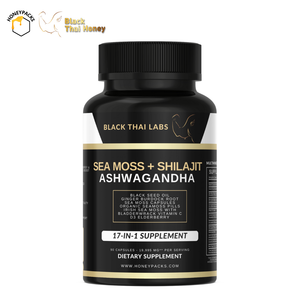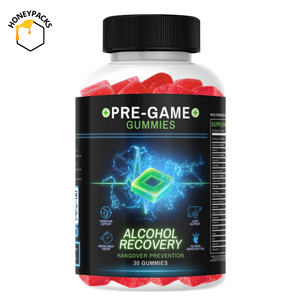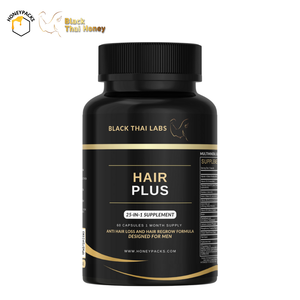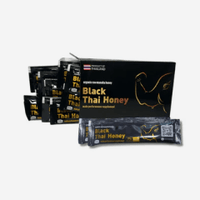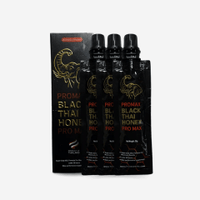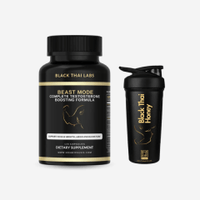When Do Men Lose Their Sex Drive? Causes, Myths & Fixes
Men’s sex drive may begin to decline gradually in their 30s, though it varies widely. Hormones, stress, health, and lifestyle all play roles. A sudden drop often signals an underlying issue, not just age.
For some, it’s a slow fade, less desire, less energy, less intensity. For others, it feels like a switch flipped overnight. One day, you’re always ready, the next, not so much.
Here’s what you need to know right away:
- Testosterone starts declining after age 30, but it’s not the only factor.
- Stress, sleep, and emotional burnout often tank libido faster than hormones.
- Relationship strain and routine can kill desire, even if nothing’s wrong.
- You can get your drive back with the right strategy and support.
At Honey Packs, we often hear people say they don’t feel like themselves anymore. That’s exactly why we created our natural performance formula to help men restore confidence, stamina, and hormonal vitality without risky shortcuts. It’s clean, fast-acting, and rooted in science.

If you're here for the full breakdown on men’s declining sex drive, what’s happening, why it’s happening, and what you can actually do about it, keep reading. We’re walking you through everything, step by step.
What’s Normal When It Comes to Male Sex Drive?
There’s no single definition of a normal sex drive, because there’s no one-size-fits-all male experience. Libido isn’t a straight line from high to low; it’s a cycle influenced by everything from stress to confidence to what phase of life you’re in.
Yes, testosterone peaks in your late teens to early 20s. Around age 30, it begins to decline at about 1% per year, but that decline doesn’t always translate to a drop in desire. Plenty of men maintain high drive into their 50s and 60s, especially those who stay active, eat clean, manage stress, and prioritize their health.
In fact, some men report feeling even more confident and dialed-in sexually in their 40s than in their 20s, largely due to less performance anxiety, a stronger sense of self, and better communication in relationships. So if your libido doesn’t look like it used to, it doesn’t always mean something’s wrong. It might just mean it’s evolving.
The Ages Men Start Feeling a Libido Drop

For most guys, changes in libido don’t hit all at once. Instead, they creep in, slowly at first, then all at once.
- Age 30–35: You might notice you’re not as easily turned on. You still can, but the spontaneous surges of drive come less often. It’s not dysfunction, it’s often mental fatigue, poor sleep, or life stress weighing you down.
- Age 38–45: This is when many men experience their first “What the hell is happening?” moment. Desire dips, energy crashes, and suddenly the old ways of getting in the mood don’t work. You’re still functional, but it feels off.
- 50s and beyond: This stage varies wildly. For some, libido drops further due to chronic stress, health issues, or low testosterone. For others, it stays strong, thanks to healthy habits, strong partnerships, or smart supplementation.
8 Common Reasons Men Lose Their Sex Drive
Testosterone matters, but it’s not the only player in this game. Here’s what else can throw your sex drive off track:
1. Hormonal Imbalances Beyond Testosterone
You could have normal testosterone and still feel off. That’s because hormones like prolactin, estrogen, and cortisol all influence your sex drive. High prolactin suppresses desire. Too much estrogen (often from excess body fat) throws off your hormonal balance. Chronic stress raises cortisol, which blunts testosterone and sexual motivation.
What matters is hormonal harmony, not just a high T number.
2. Mental Health and Chronic Stress
Anxiety, depression, and emotional exhaustion can completely shut down desire, even when everything else looks fine on paper. Many men don’t realize how much unresolved stress or trauma is draining their libido until it’s gone.
Your brain is your biggest sex organ. If it’s overwhelmed, arousal gets put on hold.
3. Relationship Disconnect
Sex is both physical and emotional. When connection fades in a relationship, desire often fades with it. If intimacy starts to feel like pressure or obligation, your brain associates it with stress, not excitement.
It’s not about attraction fading, it’s about emotional safety and communication breaking down.
4. Overweight and Poor Sleep
Extra body fat leads to higher estrogen and lower testosterone. And bad sleep tanks hormone production across the board. Studies show even a week of sleep deprivation can lower testosterone by up to 15%.
Add in sleep apnea, a condition many men don’t even know they have, and you’ve got a perfect storm for low libido.
5. Medications That Kill Desire
Plenty of common medications come with sexual side effects. SSRIs (antidepressants), blood pressure meds, antihistamines, and opioids can all dampen arousal, delay orgasm, or make it harder to get in the mood. Even if they help in other areas, the tradeoff isn’t always worth it for your sex life.
6. Low Nutrients, Bad Diet
Micronutrients like zinc, magnesium, vitamin D, and healthy fats are essential for hormone production. If your diet is heavy on processed foods and low on essentials, your libido takes the hit. Low-fat or crash diets can be especially brutal on testosterone.
7. Emotional Exhaustion
Working too much. Giving too much. Never slowing down. When you’re constantly in go mode, your nervous system has no capacity left for desire. This is common in high-performing men who are burning the candle at both ends, mentally sharp, but sexually flatlined.
8. Comparison to Younger Self
One of the biggest libido killers is expecting to feel like you did at 22. Comparing your current drive to your peak years creates a false sense of loss, and that anxiety only makes things worse. Sexuality matures, shifts, and expands. Trying to go back instead of moving forward often backfires.
Sudden vs Gradual Libido Loss, What’s the Difference?

Not all libido loss looks the same. Some men experience a slow decline, barely noticeable at first, while others feel like someone hit the kill switch overnight. Knowing the difference helps you identify what’s really going on.
A gradual decline is often tied to predictable factors: age, elevated stress, declining sleep quality, weight gain, or slipping into a sedentary routine. These changes build up quietly, making you feel off without realizing why.
A sudden drop, on the other hand, usually points to something deeper, like a hormone crash, a major emotional stressor, or even an undiagnosed health issue. This kind of shift can be jarring.
Therefore, if your sex drive changed suddenly, it’s worth investigating. Sudden drops aren’t always about testosterone. They can be your body’s way of saying something else is out of alignment, mentally, emotionally, or hormonally.
Libido Loss in Relationships: What Your Partner May Not Say
Losing your sex drive affect both you and your relationship. And the hardest part is that it’s tough to talk about.
Men often carry the silent fear that their partner will think they’re no longer attracted to them. That silence builds tension, creates distance, and turns a physical concern into an emotional one. But here’s the truth is that low desire doesn’t mean low love.
In long-term relationships, desire is about both looks or frequency, as well as connection. When intimacy starts feeling like a task or a performance, your brain can start associating it with pressure instead of pleasure. That’s not a hormone issue. That’s emotional burnout.
That fear of hurting your partner leads many men to suffer in silence, which only makes things worse for both people.
If you’re in this situation, know that your partner might feel just as confused. Open, honest communication, without shame, is often the first step to reigniting both connection and desire.
When You’re In Range but Still Feel Off: What Blood Tests Miss
Lab results can lie.
Okay, not literally, but they can give you a false sense of security. Most doctors rely on broad reference ranges for testosterone, typically anywhere from 300 to 1,000 ng/dL. So if your number falls within that range, you’re technically fine.
But you still might feel terrible at 400 ng/dL, especially if you were sitting at 800 in your peak years. Hormones aren’t just numbers; they’re ratios, balance, and bioavailability. And most standard tests don’t look deep enough.
If your libido is low and your total testosterone looks normal, it’s time to dig deeper:
- Free Testosterone: This is the bioavailable T your body actually uses.
- Estrogen (E2): High levels can suppress libido and mood.
- Prolactin: Elevated levels are a common culprit for low desire.
- SHBG (Sex Hormone Binding Globulin): Can block free T from doing its job.
- LH and FSH: Help identify if the issue is in the brain (pituitary) or the testes.
Therefore, don’t settle for “you’re in range” if you know something feels off. You’re the expert on your own body, and you deserve better answers.
What Helps Restore Male Libido

Low libido doesn’t mean you’re broken, it means your body is asking for support. And the good news is that you have options.
Natural & Foundational Changes
You don’t have to overhaul your life. But if you want your drive back, your daily habits matter more than any pill ever could.
- Weightlifting & Movement: Resistance training boosts testosterone, improves blood flow, and builds confidence, all critical to libido.
- Better Sleep & Screen-Time Boundaries: Poor sleep wrecks hormone balance. And constant scrolling? It fries your dopamine and disconnects you from intimacy.
- Emotional Processing: Suppressing stress, shame, or resentment doesn't help, it stores it in your nervous system. Letting it out (through therapy, journaling, even breathwork) can reignite drive faster than you think.
Hormonal Support, With Caution
Testosterone Replacement Therapy (TRT) is a legitimate tool, but it’s not a magic fix. It comes with trade-offs, such as fertility loss, long-term dependency, and the need for medical oversight.
If you're exploring TRT, also consider:
- Anti-Estrogens (for high E2 levels)
- HCG or Clomid (to maintain fertility)
- A full hormone panel, not just total T
Don’t jump into hormone therapy without knowing the full picture. Fixing your foundation first often makes TRT unnecessary.
Supplementation with Purpose
Not all supplements are created equal, and the gas station ones have sketchy ingredients, fake claims, and zero transparency.
Honey Packs believe in formulas that work with your body, not against it:
- Black Ginger: Expands blood vessels for better blood flow and responsiveness.
- Ginseng: Supports nitric oxide for long-lasting stamina and energy.
- Butea Superba: A traditional Thai herb that promotes natural hormone production, without side effects.

You’re Not Broken, You’re Evolving
Sex drive isn’t a static switch. It’s dynamic. It shifts with your lifestyle, your health, your emotions, your phase of life. And that’s okay.
What matters is how you respond.
Intimacy, presence, and confidence don’t come from chasing your 20-year-old self. They come from supporting your body, tuning into your mind, and reclaiming control.
With the right tools, your energy, vitality, and sex drive can return, not as a blast from the past, but as a stronger, more grounded version of you.
Reignite Your Drive With Clarity and Control
If you're tired of feeling like something’s missing, if you're done with empty claims, synthetic shortcuts, or mystery blends, Honey Packs is here to change that.
Our fast-acting formula combines the power of black ginger, ginseng, and Butea Superba to help you restore drive naturally.
If you’re ready to feel like yourself again, this is your next step.
Frequently Asked Questions
Can stress alone kill my sex drive even with healthy T?
Yes. Chronic stress elevates cortisol, which blunts desire and throws off hormonal balance, even if testosterone is technically fine.
What if I still get erections but feel no desire?
Erections are physical. Desire is emotional and mental. If you’re disconnected, tired, or burnt out, libido can disappear even if performance doesn’t.
Is libido loss permanent, or can it return?
It’s almost always reversible. But it requires listening to your body, adjusting your habits, and sometimes getting professional support. Don’t give up, desire can come back stronger than ever.
How often should men have morning wood?
There’s no perfect number, but most healthy men under 50 have 3–5 erections during sleep. A noticeable drop in frequency is a sign your hormones, or sleep, may be off.
Is there a way to boost libido without going on TRT?
Absolutely. Foundational health changes combined with targeted natural supplementation often restore balance without synthetic hormones. Start there. Then consider TRT only if needed.

